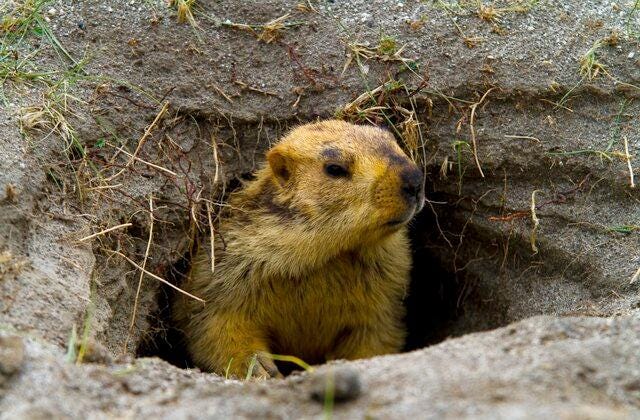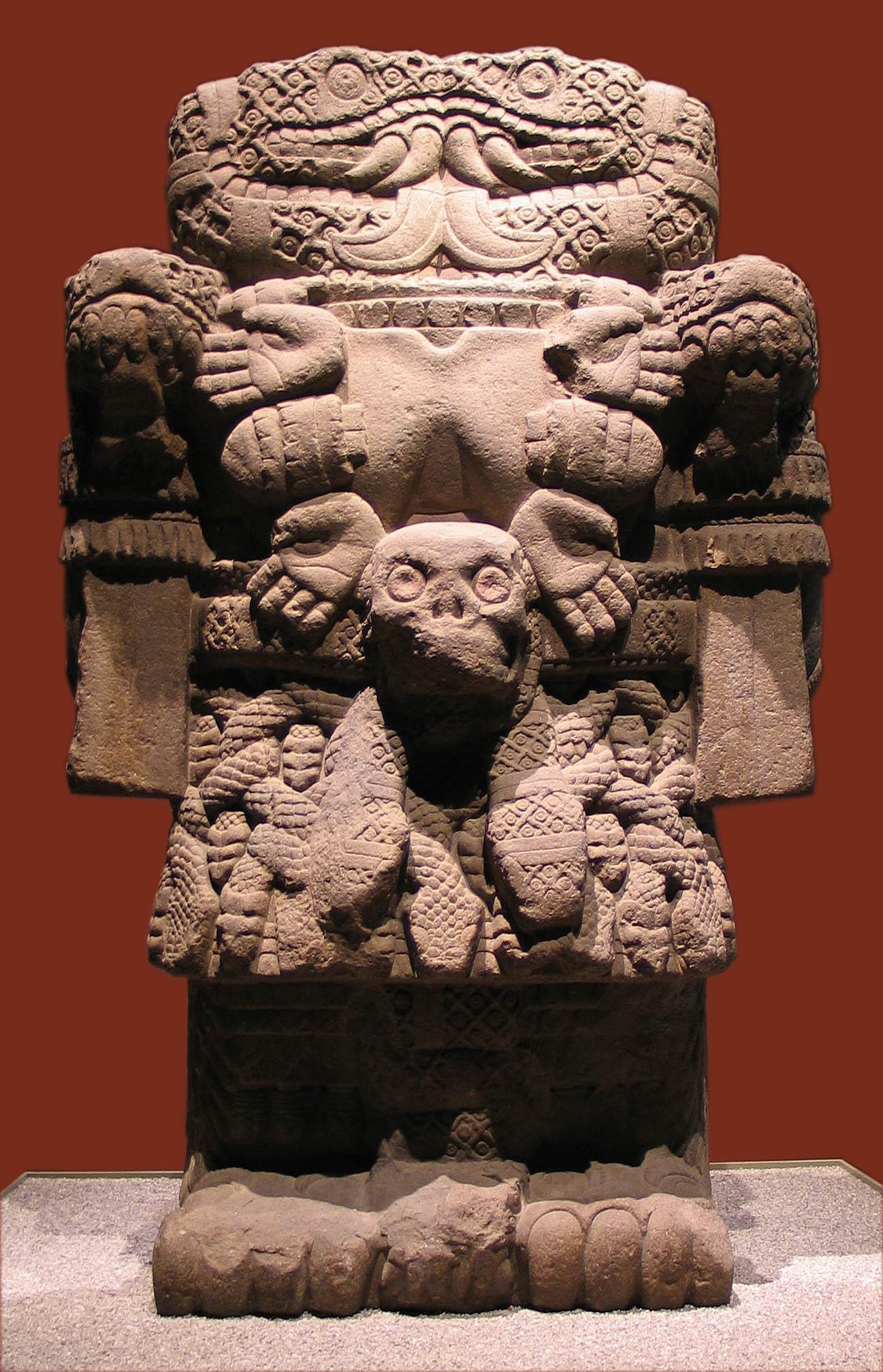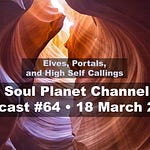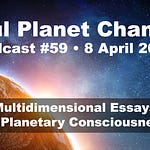During this week of Imbolc or Groundhog’s Day or St. Brigid’s Day or whatever you yourself might call it—that point in the solar calendar when you find yourself sitting exactly between the Winter Solstice and the Spring Equinox—I have found myself slowly peeking out of my groundhog hole of Winter and starting for the first time in this early anticipation of the coming Spring to see the Darkness behind me as well as the light up ahead. But unlike many people who, I assume, see that now waning period of seasonal and personal darkness in a negative light, my goal here is to explore the power and the purpose of that darkness, to unearth the deeper significance of those moments of frozen stillness. Perhaps a bit like the philosopher Hegel, I am interested in catching a glimpse of the work of the Negative. Rather than try to banish the darkness in order to celebrate the coming sunrise, I’d rather try to see what positive functions this season of darkness might offer us. I’ve grown to recognize for the first time in my life, deep down in the marrow and meat of my being, the possibility that perhaps we all share a human need for hibernation. Maybe we are meant to embrace the darkness in all its nocturnal glory.
I thought I remembered the American writer Henry David Thoreau celebrating the values of hibernation in his book Walden, a book I have taught for many decades. I thought I remembered him celebrating the hibernation season of the woodchuck that fascinated him so much throughout his book. But I found when I dove back down into the pages of Walden and his journals that what Thoreau focuses on is the moment of awakening. To be fully awake: that is the ultimate value that Thoreau celebrates.
In his Walden Thoreau writes:
Ere long, not only on these banks, but on every hill and plain and in every hollow, the frost comes out of the ground like a dormant quadruped from its burrow, and seeks the sea with music, or migrates to other climes in clouds. Thaw with his gentle persuasion is more powerful than Thor with his hammer. The one melts, the other but breaks in pieces.
After reading this passage from Thoreau’s meditation on the passing of “Winter,” I recalled that the climactic moment of his book is his chapter entitled “Spring.” It is there that Thoreau comes to his full awakening into a fuller perception of the magical modes of metaphorical transformation that the Earth itself undergoes in the Spring thaw that follows the sleep of Winter.
Now, perhaps I am still under the sway of the Winter grip of Morpheus, but I no longer trust this one-sided celebration of the sunrise, of the awakening of Spring. Thoreau ends his book with the Buddhist wisdom of the words “The sun is but a morning star.” But for the Aztecs, the power of that morning star was always deepened in its transformation into the evening star. They recognized the restorative aspects of momentary dwelling in the underworld that the evening star promises. For it is only in the Underworld, after all, that Orpheus might find his lost love Eurydice.
My question here, then, is this: What do we sacrifice when we reject the restorative depths of human hibernation?
I am Gabriel Hartley, and this is yet another episode of my Soul Planet Channel for today, the 5th of February 2023, although it might be the 6th by the time I get this episode edited and ready for you. I have entitled today’s episode “Deep Down into the Dark: The Human Need for Hibernation.”
As with all forms of social media these days, if you like this post, please hit the like buttons, share it with your friends, and become either a free or paid subscriber. If you wish to help me out in this work but do not want to sign up for a paid subscription yet, you can make a one-time donation to this project by clicking the “Buy Me a Coffee” link. That will help me try to keep this project going. In any case, thanks for being here and reading and/or listening to my message!
The Human Need for Hibernation
It’s the 5th of February 2023, and this is my first Soul Planet Channel podcast of the year.
It has been a month and a half since my last podcast—which, as it turns out, was number 52, making my work for last year equal out to one podcast per week. That was also on the Winter Solstice itself, so the timing actually feels perfect for this particular meditation.
In the coming year I plan to allow myself to perhaps take a bit more time with each entry in order to let the material I’m working with gestate and mature a little more before forcing myself to meet some calendar deadline. Even so, if I can’t make the weekly posting schedule that I had originally hoped for, I still hope to post at least twice a month. Conversely, if I feel more inspired in a particular week, I might even post two entries while still trying not to overload your mailboxes!
In this episode I am focusing on my recent meditations—or broodings, perhaps—on the human need for hibernation. And I will begin by reading from a post that I had put up on Facebook on the 5th of January of this year, exactly one month ago. As a preparatory note, let me say that in many ways this particular Facebook commentary represents a different and even unexpected kind of mood for me in terms of my self-concept and, more importantly, self-presentation. And self-concept is part of what I'm dealing with here.
Self-concept, I’ve come to see, might primarily be determined from the outside—from those kinds of inner voices we internalize that actually come from messages we receive from the culture, whether that's our families, our workplace, the media—wherever this might come from. And one of those particular notions that has tended to drive my sense of self is that I'm generally an upbeat, positive person in the sense of knowing where I'm going in this life and having a sense of meaning and mission and Buddhist equanimity and so on.
And I still have all of that—but what I've been experiencing since we moved here to Finland, now three and a half years ago, is that the dark of winter is having an impact on me. It's a little difficult to sort it out from some of the other impacts on me right now—for instance, you know, when we're in a world experiencing war on many fronts; when, like me as an American, some of you might find yourself as a representative of a belligerent nation that is fostering many of these wars, provoking these wars and the propaganda surrounding them, and yet find yourself painfully in the minority in terms of how one perceives that belligerent nation, feeling out of bounds, out of the mainstream. And in the dark of winter it seems that that sense of alienation has a more prominent impact on me, especially here in Finland where the supposed goodness of the United States is more or less taken for granted.
So on the 5th of January I wrote the following words growing out of that sense of seasonal and social darkness. The title I gave it at that time was:
I’M THE TUMBLING UNDERPANTS IN THE HOT DRYER CALLED LIFE
As I was sinking back into bed in a depressive swoon on this sunny winter afternoon, I was wondering what the source of this depression might be, and also what might be its purpose. For it seems too functional at this moment, too directed a movement to simply be a collapse of spirit, a diminution of life, an extinguishing of sunlight. There must be some food for the soul, some immanent mode of nourishment motivating this fall into lethargy and momentary despair. Like those moments of ecstasy in meditation, when you realize in the fullness of the moment that all time is one, that all meditations are THIS meditation, and that consequently time is inconsequential, this return to despair is a return to the everlasting moment of regenerative collapse.
And this moment, while always serving as a very productive element in my writing process, never enters into the writing itself. In the moment of writing I am fully alive. I am bursting in full confidence in the rightness of my statement. Statement itself becomes eternal, not simply an aggregation of discrete individual statements but as one never-ending gesture of statement, of STATING, of composing into some eternal process the instantaneity of existence, of thought as the ever-enlightening flicker of the candle flame against the doubted darkness.
The eternal moment of despair that gives birth to confidence disappears in the gesture of confidence called writing. In the levity of the moment of writing, the heavy swoop of despair remains invisible in the anterior vestibule of consciousness. It is as if despair is the unacknowledged member of the family whose perversions and violations uphold the relative goodness of family identity itself.
I have from some unknown place inherited a fear of acknowledged darkness. Despair seems too akin to failure. While the etymological evil twin of “despair” is “hope,” despair has a weight and a vacuum-like intensity that outdoes any dark thoughts by themselves—as if an individual thought had the power to inaugurate this transformative flow. This downward suck makes all a slave to its inescapable gravitational pull.
And yet, at a certain point, there is a dramatic inversion by means of which we are turned around and flung upwards, as though spit out through the whale’s blowhole. JONAH IS THE FATHER OF US ALL. The inner shaman with whom we identify, after all, came crawling up through the muck of blood, of earth’s menstrual spew, to remind us of our birthing passage through gore and pain and awakening to the light beyond the comforting fleshy enclosure of earth.
And since then I’ve been thinking about that passage a lot because it's expressing an embrace of the darkness that I don't usually engage in, not even in my own moments of individual self-consciousness, but certainly almost never in public. And I started thinking, well, what role would engaging with that Darkness play in my life? What is the function of Darkness, especially in the middle of the darkest moment of the year, the darkest evening of the year? And so I started thinking about what the cultural origins of this neglect of Darkness, this betrayal of our bodily adaptation to Darkness, might be?
And so I started looking into some various ideas out there concerning hibernation. Are we, as animals, as mammals on this planet, meant to hibernate in some sense? We clearly can't hibernate the way that bears do, or the various other animals, because our bodies never developed the capacity to sleep through a winter without eating and drinking and so on. We must have lost that capacity long, long ago if it was ever ours. If we perhaps originally evolved in more temperate climates where such seasonal dependence on sleep in the darkness wasn't necessary, then as we migrated northward into a place such as Finland, where I am now, we still never did gain a full capacity to adapt ourselves to Darkness through hibernation.
But I think there's more to it than simply where humans originated because, given that I am here now, having spent most of my life to this point in the United States in various points of North and South, Finland is now the northernmost point for me, and the darkest point in the winter I have ever experienced. It's also certainly the brightest point in the summer, when at the Summer Solstice it's never really dark, nothing called dark. The sun goes down, but it never gets dark here in the summer. The sun comes up in the winter, but it never really gets light, especially down here in southern Finland where clouds tend to be filling the winter sky at all times.
So to develop this concept of hibernation a little more, I want to read a little bit from the website clinicaltrials.gov that I randomly chose from the results of a Google search. The entry I opened is entitled: Effects of Season on Melatonin Secretion in Healthy Men and Women and Patients With Seasonal Affective Disorder and it starts out as follows:
Brief Summary:
As the seasons change during the course of the year, many animals show major changes in their behavior and physiology. Many of these changes are triggered by changes in the length of time each night that the pineal gland produces the hormone melatonin. Melatonin is produced for a longer time in winter when nights are long, than in summer when nights are short.
Some researchers believe that melatonin may play a similar role in how season effects mood of patients with seasonal affective disorder. Seasonal affective disorder (SAD) or mood disorder with seasonal pattern is a condition where the normal biorhythm is disturbed during a season, especially autumn-winter. Patients may begin experiencing or experience worsening of depressive symptoms. Patients complain of being constantly tired, craving sugary foods, overeating, and over sleeping.
Now that certainly makes sense as a description of what's been happening to us here in Finland. But I have a problem with the label Seasonal Affective Disorder, because I wouldn't call this a disorder. It's certainly considered a disorder in the framework that defines a proper human being or proper human behavior as a functioning productive unit in a social network of production, of products we make mostly for people other than ourselves. This is a disorder of the system in that we are not serving those definitions. We're not meeting the role, the definition of the rules we are assigned.
And is that what we are really supposed to be doing in the winter? You know, this winter productiveness seems to be the actual disorder from my perspective. The expectations on human beings in moments of Darkness seem to betray what is actually going on in our bodies and, as a result, in our minds. If we take this notion of melatonin production seriously, this is something that is a natural function in response to our environment. So to what extent are we denying our natural inclinations to adapt to the environment in ways that are healthy? Perhaps “healthy” means giving the body time to rest, giving the body time to recharge itself. So if I get back to my Facebook statement I had read earlier, I refer to that return to despair as “a return to the everlasting moment of regenerative collapse.” Collapse serves a very important function in the maintenance of motivation, for one thing, but we don't allow ourselves the capacity to embrace that.
Our Shadow Selves
On another level, what's going on here is a denial of what Carl Jung refers to as the Shadow, that aspect of ourselves that we tend to suppress and overlook because it doesn't meet the definitions that we have of ourselves. And so, according to Jung, we tend to project those qualities that we see as negative onto those outside of us.
Jung’s concept of the Shadow refers to a creature of the unconscious whose power and ferocity (and rebelliousness) arise from its repressed condition: “How else,” Jung asks, “could it have occurred to man to divide the cosmos, on the analogy of day and night, summer and winter, into a bright day-world and a dark night-world peopled with fabulous monsters, unless he had the prototype of such a division in himself, in the polarity between the conscious and the invisible and unknowable unconscious?” (Archetypes187). The shadow, then, is an avatar of duality and opposition, a constitutive duality we rarely become conscious of in our daily lives, and yet one that informs our most deeply held oppositions. And this unconscious inner antagonism fuels our thoughts and acts of hatred and destruction. Being incapable of accepting our own dangerous and destructive inner side, we project these qualities onto some external entity.
As Americans, for instance, we are in reality acting as the invading nation, but we will put that label on all other nations rather than take a look at ourselves and ask, “What are we doing to provoke these responses that we call negative?” So that shadow aspect of our own identity, social and individual, is something we reject. Gloria Anzaldúa spent quite a bit of time pursuing this, and that was one of the aspects of her work that most appealed to me—her engagement with what she called the Shadow Beast and the importance of that as a diving down into the depths so that we could have a kind of rebirth from out of there in this kind of shamanic awakening into our full capacities. Drawing on her identification with the Aztec goddess Coatlicue, the serpent aspect of Mother Nature, Anzaldúa writes,
We try to waken the Shadow-Beast inside us. Not many jump at the chance to confront the Shadow-Beast in the mirror without flinching at her lidless serpent eyes, her cold clammy moist hand dragging us underground, fangs bared and hissing. How does one put feathers on this particular serpent? But a few of us have been lucky—on the face of the Shadow-Beast we have seen not lust but tenderness; on its face we have uncovered the lie. (Borderlands 42)
Let me now read from a passage that I think are important here one from my blog post which was in my Sacred Sites Project Blog originally on the 14th of August 2020 and later reposted in my Soul Planet Channel podcast on the 16th of October of 2022. (I will give links to those down at the bottom of this post.) Here's what I said there in response to Robert Frost’s poem “After Apple-Picking”:
Like the dropped apple, the speaker’s consciousness—and perhaps our own—has fallen from the transformative ice-pane awe of morning to the suspended reach toward heaven to the dropping back to troubling earth in dream-troubled sleep. We are invited into this meditation on the troubled nature of sleep that lies on the other (future) side of this dozing transition: Is this the restorative pause in the animal cycle provided by winter hibernation or just an all-too-human momentary stay against confusion? Will the future be futural enough?
One can see what will trouble
This sleep of mine, whatever sleep it is.
Were he not gone,
The woodchuck could say whether it's like his
Long sleep, as I describe its coming on,
Or just some human sleep.And yet, despite the seeping resignation of this exhausted state, the poet, unaware, is able to maintain a perceptual awareness that allows him a communicative communion with the sleeping things of nature: the woodchuck cannot say what kind of sleep this is, not because woodchucks and humans cannot communicate (the conventional understanding that sees fallen apples as degraded) but because the woodchuck has already dropped into his own animal version of dream consciousness in his earthen burrow and his earthen consciousness. The earth that is seen to pollute the fallen apple is now the natural home of more-than-human sleep.
Were they both awake, we could join the poet in a communal mode of human-and-animal earthen consciousness that the draining nature of the world of desire-turned-work eclipses. And this remains the promise, ultimately, of the poem itself: despite the dropping-down-to-earth experiences that might from time to time trouble our sleep, in the end this superconscious mode of natural communication remains at our disposal. In the end, this consciousness provides its own gifts, a mode of cohabitation that suspends the categorical distinctions that normally frame our interactions with the world, despite the common remonstrations that such a mode of engagement is to be seen “as of no worth.” And in this sense, we become the ladder itself suspended still between heaven and earth, past and future, human and animal, as we drift dreaming into our human-woodchuck sleep with its hopeful lure of future rest.
In a journal entry on the 30th of December 1853, Thoreau does dwell on the dormant aspects of human winter hibernation. He writes:
In winter, every man is, to a slight extent, dormant, just as some animals are but partially awake, though not commonly classed with those that hibernate. The summer circulations are to some extent stopped, the range of his afternoon walk is somewhat narrower, he is more or less confined to the highway and woodpath; the weather oftener shuts him up in his burrow, he begins to feel the access of dormancy, and to assume the spherical form of the marmot, the nights are longest, he is often satisfied if he only gets to the post office in the course of the day. The arctic voyagers are obliged to invent and willfully engage in active amusements to keep themselves awake and alive. [Endquote]
So this remains my question: TO WHAT EXTENT IS HIBERNATION A NECESSARY YET NEGLECTED HUMAN NEED? Is our rejection of a human fallow period during the winter simply another part of our materialistic culture, where senseless productive human activity has become the real opiate of the masses? To what extent have we crushed our natural bodily and mental adaptations to the circadian and seasonal rhythms of our lives?
Don’t get me wrong: I am not in any way meaning to disparage the importance of awakening. Instead, what I am trying to explore here is the depth and importance and absolute necessity of those moments of creative dormancy that lay us out in winter and subject us to the dozy expansiveness of the waking dream state. We can travel much farther, I believe, in sleep than in our waking moments. In any case, what I am seeking is a sense of—indeed a respect for—the crucial human qualities that are nurtured and nourished in our quieter moments.
Intro— “Kind of a Party” by the Mini Vandals
Interlude 1— “Float” by Geographer
Interlude 2— “Drifting at 432 HZ” by Unicorn Heads
Interlude 3— “Glimpsing Infinity” by Asher Fulero
Outro— “Read All Over” by Nathan Moore

















Share this post